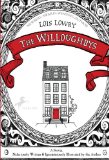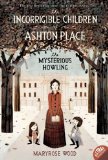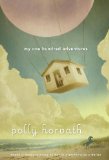Summary | Excerpt | Reviews | Beyond the book | Read-Alikes | Genres & Themes | Author Bio

Critics' Opinion:
Readers' Opinion:
First Published:
Mar 2008, 176 pages
Paperback:
Mar 2010, 176 pages
 Book Reviewed by:
Book Reviewed by:
Jo Perry
Buy This Book
Lois Lowry's adroit satire will enlighten and entertain winning
waifs, audacious au pairs, woeful widowers, punctilious postmasters, relentless
realtors, mixed-up mountaineers, and ordinary children and their parents.
Once upon a time children's stories celebrated spunk, not spite. Intrepid young
heroes and ungossipy heroines triumphed over evil and got lots of fresh air,
wholesome exercise and nutritious snacks in the process. Nostalgia for these
bygone books, and the daycare- and Internet-free childhoods that contained them,
informs the success of recent retro bestsellers such as A Series of
Unfortunate Events, The Penderwicks, The Dangerous
Book for Boys, the Harry Potter series, and the wizarding genre that hatched around it like a clutch of dragon eggs.
Lois Lowry's The Willoughbys is the latest faux antique to hit your
quaint little bookshop's fusty shelves. To make sure the reader gets the joke,
Lowry's blast from the past includes pointedly charming retro pen and ink
illustrations; wavy old-fashioned fonts, and alliterative, adverb-laden diction
("A Novel Nefariously Written & Ignominiously Illustrated by the Author").
Luckily for young readers, a glossary at the back of the book explains what
"nefariously," "ignominiously" and all the other big, fancy words mean, and
there's even a bibliography of the oldies-but-goodies Lowry so thoroughly
skewers and admires. It's clear that Lowry had great fun writing the story,
drawing its forthright, dot-eyed characters, compiling comical definitions, and,
by means of her bibliography, connecting The Willoughbys' dramatis
personae to their classic counterparts.
The quartet of child-Willoughbys are victims of relentless parental indifference
(their parents don't care enough to properly name or feed them) that soon
becomes homicidal. Fortunately, the "odious" nanny their parents hire turns out
to be efficient, affectionate, responsible, and an accomplished cook. And in
this story, you are what you cook: Lighter-than-air lemon soufflés, dizzyingly
delicious-smelling fresh-baked cookies, and an assortment of chocolately, nutty
and gooey candies are associated with those who are good, generous, and kind.
Hideous meatloaf and dry muesli are what bad people serve; take-out pizza is
what horribly sad people eat for dinner. The highest honor is to have a candy
bar named after you.
Once it gets going, the plot careens along a slippery but familiar path until it
reaches its satisfying, no-loose-end-untied, bad-things-happen-to-bad- people
outcome. We know that orphans-adrift stories require happy endings, so the suspense comes from wondering how Lowry will make things right and tie the loose ends into an extravagant bow.
Lowry places the Willoughbys in a minimalist world of archaic mansions, sidewalks, and tall, thin
houses. Their "old fashioned" lives are lived without the luxuries of e-mail,
cell phones, nosy neighbors, or Child Protective Services. Babies are left in
baskets on doorsteps and no one comes looking for them. People get lost and stay
lost for a long time. Communication is antiquarian, via postcard or letter --
words matter, but missives can remain unread for ages. Climbers quick-freeze in
the Alps while Swiss kids in lederhosen and knee socks watch their demise
through binoculars. Money evaporates like steam except for those who live in
mansions for whom it comes in "oodles."
To be truly delectable, The Willoughbys must work for children who haven't read
Toby Tyler, Or, Ten Weeks with the Circus; Ragged Dick; Pollyanna; Heidi; or
The Bobbsey Twins and Baby May. It does. Despite Lowry's satiric
distancing and its jokes and puns, when the Willoughbys, homeless and hungry in
more ways than one, finally discover that they're valuable, worthy of
nourishment, and capable of bringing joy to grown-ups, we applaud.
About the Author
 Lois Lowry is known for her versatility and invention as a writer. She was born in Hawaii and grew up in New York, Pennsylvania, and Japan. After several years at Brown University, she turned to her family and to writing. She is the author of more than thirty books for young adults, including the popular Anastasia Krupnik series. She has received countless honors, among them the Boston Globe-Horn Book Award, the Dorothy Canfield Fisher Award, the California Young Reader’s Medal, and the Mark Twain Award. She received Newbery Medals for two of her novels, Number the Stars and The Giver. Her first novel, A Summer to Die, was awarded the International Reading Association’s Children’s Book Award. Ms. Lowry now divides her time between Cambridge and an 1840s farmhouse in Maine.
Lois Lowry is known for her versatility and invention as a writer. She was born in Hawaii and grew up in New York, Pennsylvania, and Japan. After several years at Brown University, she turned to her family and to writing. She is the author of more than thirty books for young adults, including the popular Anastasia Krupnik series. She has received countless honors, among them the Boston Globe-Horn Book Award, the Dorothy Canfield Fisher Award, the California Young Reader’s Medal, and the Mark Twain Award. She received Newbery Medals for two of her novels, Number the Stars and The Giver. Her first novel, A Summer to Die, was awarded the International Reading Association’s Children’s Book Award. Ms. Lowry now divides her time between Cambridge and an 1840s farmhouse in Maine.
![]() This review was originally published in The BookBrowse Review in April 2008, and has been updated for the
April 2010 edition.
Click here to go to this issue.
This review was originally published in The BookBrowse Review in April 2008, and has been updated for the
April 2010 edition.
Click here to go to this issue.

If you liked The Willoughbys, try these:

by Maryrose Wood
Published 2011
The Incorrigible Children of Ashton Place are no ordinary children, Miss Penelope Lumley is no ordinary governess, and mysteries abound in this first volume in a new series for ages 9+.

by Polly Horvath
Published 2010
The winner of a National Book Award, a Newbery Honor, and countless other awards has written her richest, most spirited book yet, filled with characters that readers will love, and never forget.





The House on Biscayne Bay
by Chanel Cleeton
As death stalks a gothic mansion in Miami, the lives of two women intertwine as the past and present collide.

The Flower Sisters
by Michelle Collins Anderson
From the new Fannie Flagg of the Ozarks, a richly-woven story of family, forgiveness, and reinvention.

The Funeral Cryer by Wenyan Lu
Debut novelist Wenyan Lu brings us this witty yet profound story about one woman's midlife reawakening in contemporary rural China.
Your guide toexceptional books
BookBrowse seeks out and recommends the best in contemporary fiction and nonfiction—books that not only engage and entertain but also deepen our understanding of ourselves and the world around us.